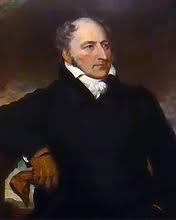
I was today reading along in Wain's biography of Dr Johnson when I came to the following passage, in Chapter 9:
About the time he signed the contract for the Dictionary, in fact, Johnson made the acquaintance of one of the most idiosyncratic figures in all his gallery: a man who was to be a lifelong friend, to live in his house for twenty years, and to inspire his finest utterance as a poet.
This was Robert Levett, a silent, morose northcountryman several years Johnson's senior. Like most of Johnson's proteges he had a strange history. Beginning as an apprentice to the wool trade in his native Hull, he had gone on to work briefly as some kind of upper servant in a nobleman's household, and saved enough money out of his wages to indulge a fancy for foreign travel. After wandering for a time in Italy and France, he had become a waiter at a Parisian cafe whose patrons were mainly medical men. Levet had always been interested in medicine, and the convivial doctors encouraged him by admitting him to lectures and demonstrations at the local hospital. Under their influence Levet gradually metamorphosed from a waiter to a physician. In this character he returned to England, and from then on eked out a regular, though meagre, living by mixing ointments and powders for the ailments of coachmen, fishporters and bricklayers. For his services he accepted such payment as they could offer; if they had no money, he made it a principle to take his fee in kind, and Johnson noted with interest that Levet, though not a bibulous man, often staggered home drunk because a dram of some villainous brew was the only quid quo pro that was going.
Johnson's life has some of the appeal of a picaresque novel, filled as it is with crazy adventures and outlandish characters, with this added fillip: it's true. That Johnson loved Levet is part of why I love Johnson. The imaginative reader may perhaps detect something rather sad in the story as well: Levet's kindly ministrations, which however must have been mostly ineffectual, and the mutual neediness that likely drew Johnson and Levet together. When I contemplate Johnson's unusual household, and try to equate it with something in our own time, I can think only of the conclusion to Broadway Danny Rose, wherein the slumping talent manager played by Woody Allen hosts Thanksgiving dinner for all his eccentric, dreaming, failed entertainers. But Johnson was hardly a slumping and somewhat absurd talent manager. He was one of the great men of his time, of any time, and when he came home at night from talking at club with the likes of Goldsmith and Burke, it was to a household populated with the likes of Robert Levet. Here's more of the funny, sad tale:
Just how Johnson fell in with Levet we do not know. But the dour, monosyllabic Yorkshireman had a story to tell, and somehow Johnson got it out of him. They became, and remained, inseparable friends. Together, they must have presented a strange appearance; the huge, heavy-featured Johnson with his peering, shortsighted eyes and rolling gait: the thin, swarthy Levet, whose face had a scorched appearance as of an alchemist who had stood too close to his own furnace.
One thing we know for certain: there was no great liking between Levet and Tetty Johnson [Samuel's wife]. Her opinion of him is not on record, but it was certainly unflattering. And his opinion of her? Levet was always very economical of words, and when, years later, Mrs Thrale asked him about Tetty, he replied that she was 'always drunk and reading romances in her bed, where she killed herself by taking opium.' Levet was never one to dress up a hard situation in soft words. Neither, on the other hand, was he a liar. The sad decline of Elizabeth Johnson's life is somewhere, like a plangent little melody played just out of earshot, in the spaces between those few and comfortless words.
I am indebted to James Wolcott for guiding me to Wain's biography. For all his good traits, Johnson appears to have failed as a husband. Here is his poem on the occasion of Levet's death, "his finest utterance as a poet," according to Wain.
